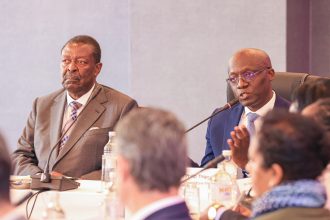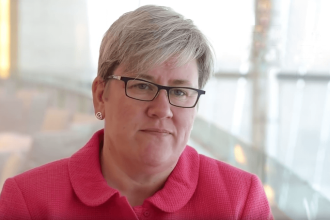By Lenah Bosibori
The Kenya Agricultural and Livestock Research Organization (KALRO) has digitized its agricultural innovations, making them easily accessible to farmers through digital and mobile-friendly platforms.
Speaking in Nairobi during a media briefing ahead of the CGIAR science Week to be held in Nairobi from 7-12 April, Dr. Eliud Kireger, Director General of KALRO said this move aims to bridge the gap left by underperforming extension officers, ensuring that farmers can readily access vital information on climate-smart farming techniques, improved seed varieties, and modern pest and disease management strategies.
“For us to help our farmers, we have ventured digitizing all our innovations so that they are easily accessible on digital platforms, whether it is mobile platforms or through ICT,” said Dr Kireger.
Dr Kireger said digitizing all its technologies is important given that climate change poses one of the biggest challenges facing small scale farmers.
He also added that during the science week in April, they will showcase the technologies they have developed locally and elsewhere.
“We will be showcasing the technologies that we have developed both within and elsewhere, and those that are ready to be taken up by our farmers to increase our food and nutrition security, added Dr Kereger.
In Addition, Dr Kereger added that they aim to showcase the innovations to show that science can help in producing more with less and help produce while still conserving natural resources. And that agriculture as a sector is the solution to climate change.
“Right now, we are painting agriculture as the emitter of 37%, which is true, but at the same time we are sequestering carbon a lot in our soils, in our plants, in our oceans. So, we need to bring that scientific knowledge to bring better awareness of the importance of the agriculture sector, both in terms of feeding the population, but also in terms of sequestering and cleaning up the air,” he adds.
Nairobi having been chosen for this science week is very important for Kenya, because it means that Kenya is recognized as a very important hub in terms of agricultural research and transformation, especially in Africa.
“Other partners are going to showcase models in agricultural transformation that have worked elsewhere. They are going to showcase technologies, innovations and management practices that are ready for uptake,” reiterated Dr Kereger.
Further Dr Kereger adds that research is very expensive because they work closely with partners like CGIAR for funding to increase their research. “We form joint partnerships, joint proposals, because most of the technologies that are developed are not applicable to Kenya only,” he adds.
They are applicable across the region, especially with similar climatic conditions, similar socioeconomic conditions, it is easy to apply those technologies across the sub-Saharan continent.
According to Dr Kererger, drought-tolerant climate technologies in agriculture directly impacts farmers and the economy. “That’s why whenever we have droughts, and our agricultural production goes down, it directly affects the Gross Domestic Product (GDP).”
The current challenges in the agricultural sector are climate change. Specifically for sub-Saharan Africa and for Kenya is access to those technologies according to Dr Kereger.
During the Science week, Dr Kerger promised farmers and all the agricultural stakeholders that they will see a lot of climate-smart technologies, drought-tolerant crops, breeds that are tolerant to leeches and which can survive in our arid and semi-arid areas.
“You are going to see technologies for mitigating new pests and diseases that have come with climate change, real-time agronomic data, technologies that accelerate the access of these technologies to farmers,” he adds.
These will be technologies that are suitable for our small-scale farmers, medium scale farmers and our future. Because most of the time, large-scale farmers are able to access technology very easily.
“For Kenya, if our farmers get the technology, the latest knowledge, right plant material, right seed, quality seed, inputs, whether they are agrochemical, pesticides, herbicides, and fertilizer, you’ll see a major shift in agricultural productivity on our farms, and that will ensure food security in this country,” he adds.
Dr Kerger also urged the government to focus on how farmers can easily afford seeds, seedlings, pesticides and herbicides, because currently I understand they are quite expensive.
Dr. Ismahane Elouafi, Executive Managing Director of CGIAR on her part added that farmers need an innovation and vibrant environment for manufacturing to be carried out locally.
“We need to create an innovation and a vibrant environment for innovation, so that the Small Micro Enterprises can thrive locally and that the manufacturing is happening here, be it on fertilizer, mechanization or seed production,” shares Dr Elouafi.
We also created what we call climate smart villages in Kenya that combine agroforestry, climate smart seeds, and solar irrigation to boost productivity and income for the farmers according to Dr Elouafi.
“Our farmers have become very receptive to modern farming technologies. That’s why during the planting season, especially for maize and beans, farmers are scrambling for certified seeds. And whenever the seed is of poor quality, farmers make a lot of complaints,” adds Dr Kereger




